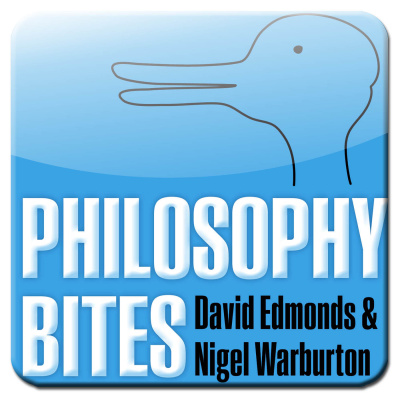Sinopse
top philosophers interviewed on bite-sized topics
Episódios
-
Michael Sandel on What Shouldn't Be Sold
28/05/2009 Duração: 18minMichael Sandel. 2009 Reith Lecturer, discusses the moral limits of markets. You can follow Nigel Warburton discussing Sandel's first Reith lecture on Twitter on www.twitter.com/philosophybites from 10.15 p.m UK time on the 13th June as this lecture is broadcast on BBC Radio 4. Add '#goodradio' or '#Reith2009' to any comments you make on Twitter.
-
Allen Buchanan on Enhancement
16/05/2009 Duração: 19minPhilosophy Bites looks at ethical questions raised by enhancement. Technological developments have opened up many new opportunities for intervening in biological processes to improve ourselves. Allen Buchanan of Duke University discusses some of these and their implications in conversation with Nigel Warburton.
-
Walter Sinnott-Armstrong on Moral Psychology
02/05/2009 Duração: 14minMoral psychology is the empirical study of how people make moral judgements. In this episode of the Philosophy Bites podcast Walter Sinnott-Armstrong discusses the relevance of psychological research to moral philosophy.
-
Thomas Hurka on Pleasure
18/04/2009 Duração: 17minPleasure is something we all want. But is it, and should it be the only thing that we want? Is pleasure all the same kind of thing? Philosopher Thomas Hurka explores the concept of pleasure in conversation with Nigel Warburton in this episode of the podcast Philosophy Bites.
-
Terence Irwin on Aristotle's Ethics
04/04/2009 Duração: 17minThis episode of the Philosophy Bites podcast focuses on Aristotle's Ethics. In conversation with Nigel Warburton, Terence Irwin of Oxford University explains the key features of this influential work.
-
Raymond Tallis on Assisted Dying
21/03/2009Assisted dying, providing a patient with the means to kill themselves, is a highly controversial issue. For this episode of the Philosophy Bites podcast Raymond Tallis, who is both an eminent gerontologist and philosopher, discusses this topic and some of the moral issues surrounding it with interviewer Nigel Warburton.
-
Julian Savulescu on the 'Yuk' Factor
08/03/2009 Duração: 13minShould we base our morality on our emotional reactions of disgust? We all have a sense of 'yuk' at some activities or situations. Julian Savulescu of Oxford University discusses the relevance of revulsion to our moral judgements in this episode of the Philosophy Bites podcast.
-
Sebastian Gardner on Sartre on Bad Faith
20/02/2009 Duração: 15minJean-Paul Sartre's notion of Bad Faith lies at the core of his existentialist classic Being and Nothingness. In this episode of the Philosophy Bites podcast Sebastian Gardner explains what Sartre meant by Bad Faith.
-
Keith Ward on Idealism in Eastern and Western Philosophy
06/02/2009 Duração: 16minQuestions about the nature of reality are at the heart of all philosophy in both Western and Eastern traditions. Keith Ward gives an overview of the idealist tradition in some Indian philosophy and draws parallels between this tradition and some Western thinkers.
-
David Papineau on Scientific Realism
22/01/2009 Duração: 18minScientists talk about sub-atomic particles which are invisible to the eye. Do such particles really exist? Or are they simply convenient fictions that, for the moment at least, explain the observable phenomena? David Papineau discusses and defends scientific realism in this episode of Philosophy Bites.
-
Kate Soper on Alternative Hedonism
11/01/2009 Duração: 15minKate Soper believes that we need to rethink how we live in the light of impending environmental catastrophe. She maintains that alternative ways of living can be more enjoyable than consumerism.
-
Chandran Kukathas on Genocide
29/12/2008 Duração: 15minGenocide is, at first glance, a straightforward term. We understand what it is and why it is such an evil. But, as Chandran Kukathas of the London School of Economics argues in this episode of the Philosophy Bites podcast, perhaps the received definition of this term needs refinement.
-
M.M. McCabe on the Paradox of Inquiry
14/12/2008 Duração: 16minHow do we learn anything? This isn't a puzzle until you start thinking hard about it. In his dialogue The Meno, Plato presented an apparent paradox about inquiry. M.M. McCabe discusses this paradox and its continuing relevance.
-
Raymond Tallis on Parmenides
07/12/2008 Duração: 15minParmenides was one of the most important pre-Socratic philosophers. Raymond Tallis discusses his ideas and influence in this episode of the Philosophy Bites podcast.
-
Don Cupitt on Non-Realism about God
30/11/2008 Duração: 15minDon Cupitt, a controversial theologian and philosopher, whose BBC television series and book The Sea of Faith was extremely influential, giving birth to a theological movement, believes that most religion is too anthropomorphic. In this interview for the Philosophy Bites podcast he explains his non-realist approach to God.
-
Wendy Brown on Tolerance
23/11/2008 Duração: 14minTolerance is usually thought of as the great virtue of democratic societies. Wendy Brown of UC Berkeley asks some sceptical questions about the concept of tolerance and how it can be used to express power relationships in this interview for Philosophy Bites.
-
Anne Phillips on Political Representation
16/11/2008 Duração: 18minPolitical representation in a democracy doesn't necessarily reflect the variety of people within a society. Most noticeably, there is a much lower percentage of women acting as representatives than there is in the wider population. Does this matter? Anne Phillips believes it does. She explains why in this episode of the Philosophy Bites podcast.
-
Anthony Grayling on Bombing Civilians in Wartime
09/11/2008 Duração: 12minAnthony Grayling argues that bombing civilians in Dresden and other German cities in the Second World War was morally wrong.
-
Christopher Shields on Personal Identity
03/11/2008 Duração: 21minWhat makes anyone the same person over time? In this interview for Philosophy Bites Christopher Shields addresses this question of personal identity, one which, as he points out, has perplexed philosophers since antiquity.
-
Alexander Nehamas on Friendship
26/10/2008 Duração: 12minAlexander Nehamas explores the value of friendship in this interview with Nigel Warburton for the Philosophy Bites podcast.



